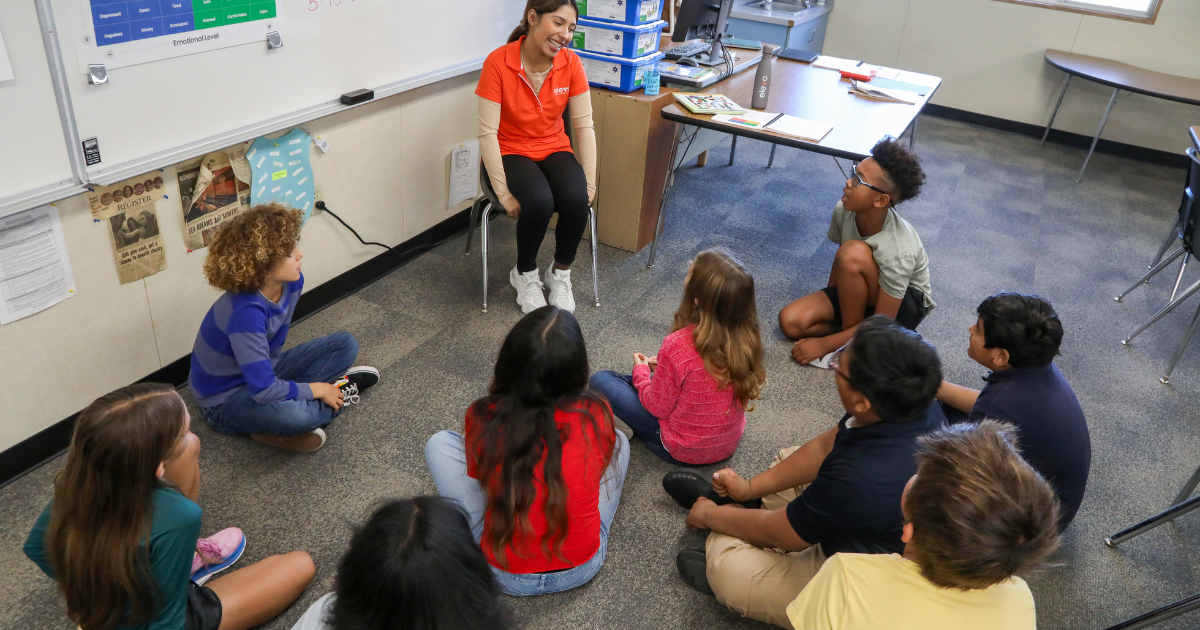
By Dr. Christina Whalen, BCBA and Dr. Kristen Henry, PPS, ABSNP
Para español desplácese hacia abajo.
When we talk to prospective district partners, we’re often asked the questions “How does Elevo support positive student behavior?” The answer is both profoundly simple and existentially complex. We support student success, be that academic, behavior, or social emotional through a simple framework known in education as Multi-Tiered Systems of Support (MTSS). The MTSS structure organizes our adopted evidence-based student supports; from the foundational practices that all students receive, to the practices that guide us when a student is in crisis. Like our district partners, we leverage the intentional design that fosters the development of each whole child. The California MTSS Framework that we know across the state incorporates 5 evidence-based domains in support of 11 features to create inclusive and equitable learning environments.
With MTSS, adopted resources are organized in three tiers. Tier One includes Universal Supports provided to ALL students regardless of their profile of needs. These practices include Universal Design for Learning (UDL) and Social Emotional Learning (SEL). Tier Two resources are Supplemental Supports that SOME students will access, depending upon their needs. A reading intervention program or short term counseling groups would fall in this tier. Tier Three supports are those that are Intensified to meet the needs of a FEW students on any given day. Examples of these resources are crisis response and long term services that may be defined by a student’s IEP. Like a metaphorical market, with shelves full of practices, supports, and services, adults peruse the options and make selections so that each student’s needs are met and success is within reach.
Most often we think of MTSS in the context of the school day, but considering the recent evolution of the afterschool landscape in the state of California resulting from Expanded Learning Opportunities Program (ELO-P) funding, we find both opportunity and obligation to expand the use of this wise framework to our afterschool programs. At Elevo, we’ve skimmed off the top of the pool of high impact practices, organized them in our MTSS framework, and trained our coaches that when they’re in doubt, they should rely on the tiers.
Elevo’s Tier 1 -Universal Supports (All Students)
These efforts are embedded in our program’s instructional design to provide access for all. At Elevo, this includes our five Core Practices, routines that are integrated daily into all programs. One such practice is the Community Circle. This restorative activity encourages all students to voice their perspectives, fostering communication within a predictable, healthy and secure community. By emphasizing foundational relationship skills, it promotes safety and contributes to a positive climate.
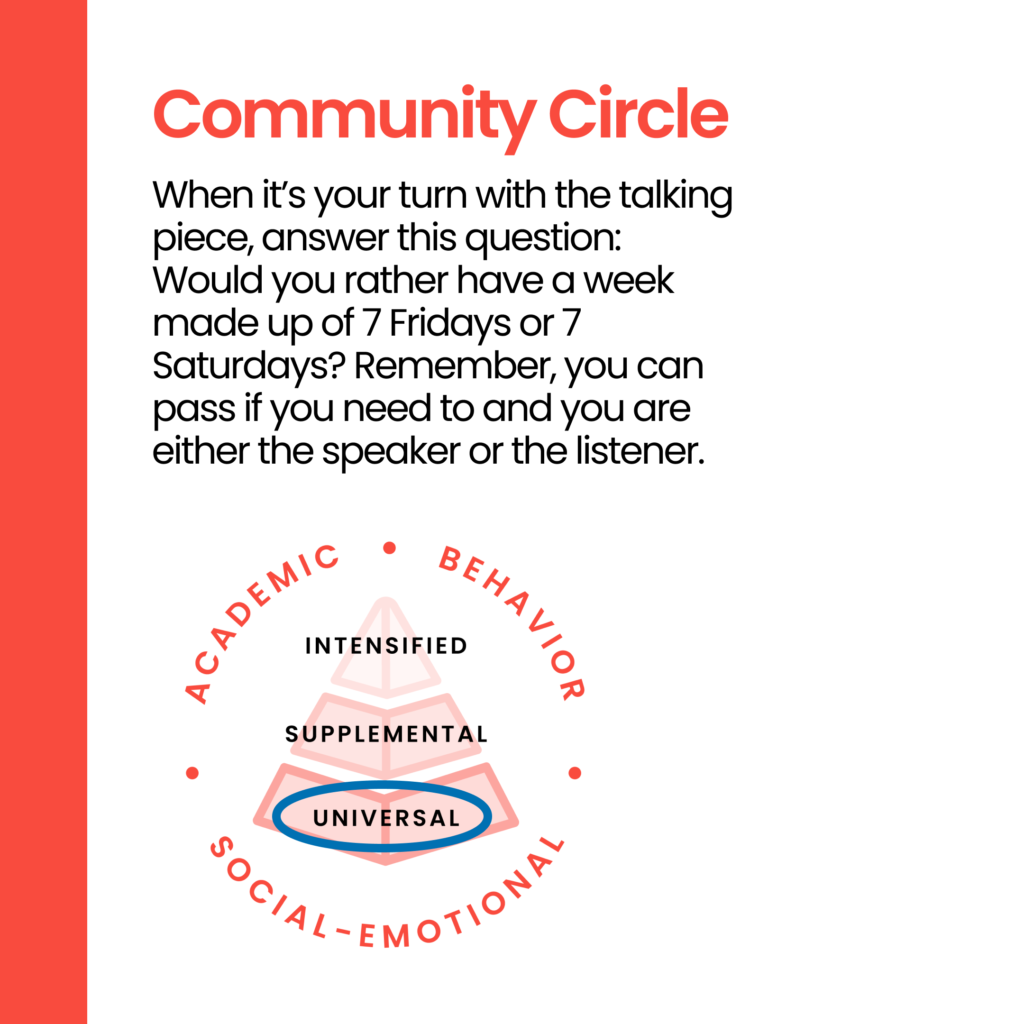
Elevo’s Tier 2: Supplemental Interventions (Some Students)
Tier 2 supports are designed for those who may require additional help to access success and be included. Knowing that difficulties will arise, our coaches are prepared with tools to help navigate and develop lagging skills. One example of our high impact tier two practices is what we call the Plot Twist, which is just what it sounds like. When a coach sees that a student is initially becoming distracted or disengaged and could benefit from a disruption, the coach leads a shift in their attention and re-engages them in an activity. It’s not brain science, but also it is…
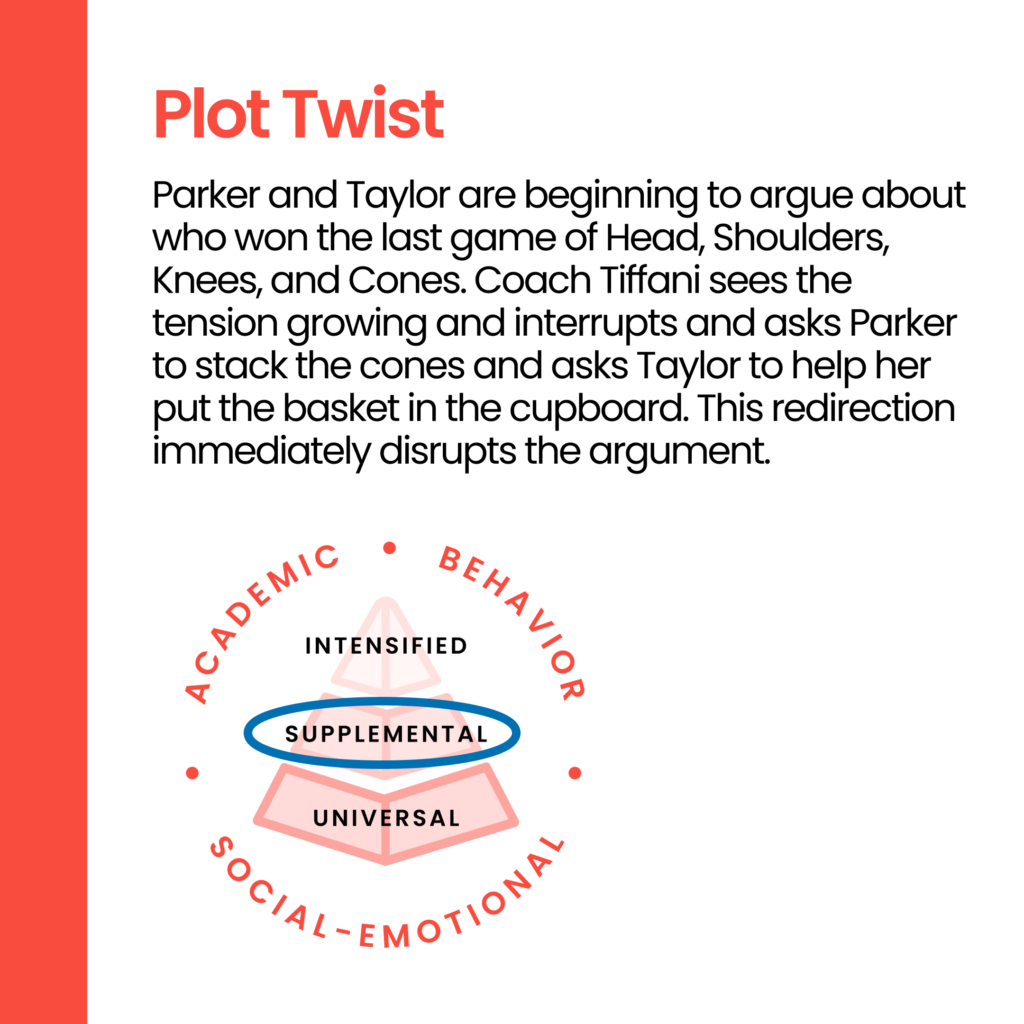
Tier 3: Intensified Interventions (Few Students)
These supports are most seldom used and with the increased flexibility in afterschool programs and opportunity to redefine success for learners, we find that escalations and the need for intensive interventions are less frequent. However, Coaches are trained about the science of coregulation and how to respond when a student is in crisis; tending first to student safety and second to Do No Harm until the storm passes.
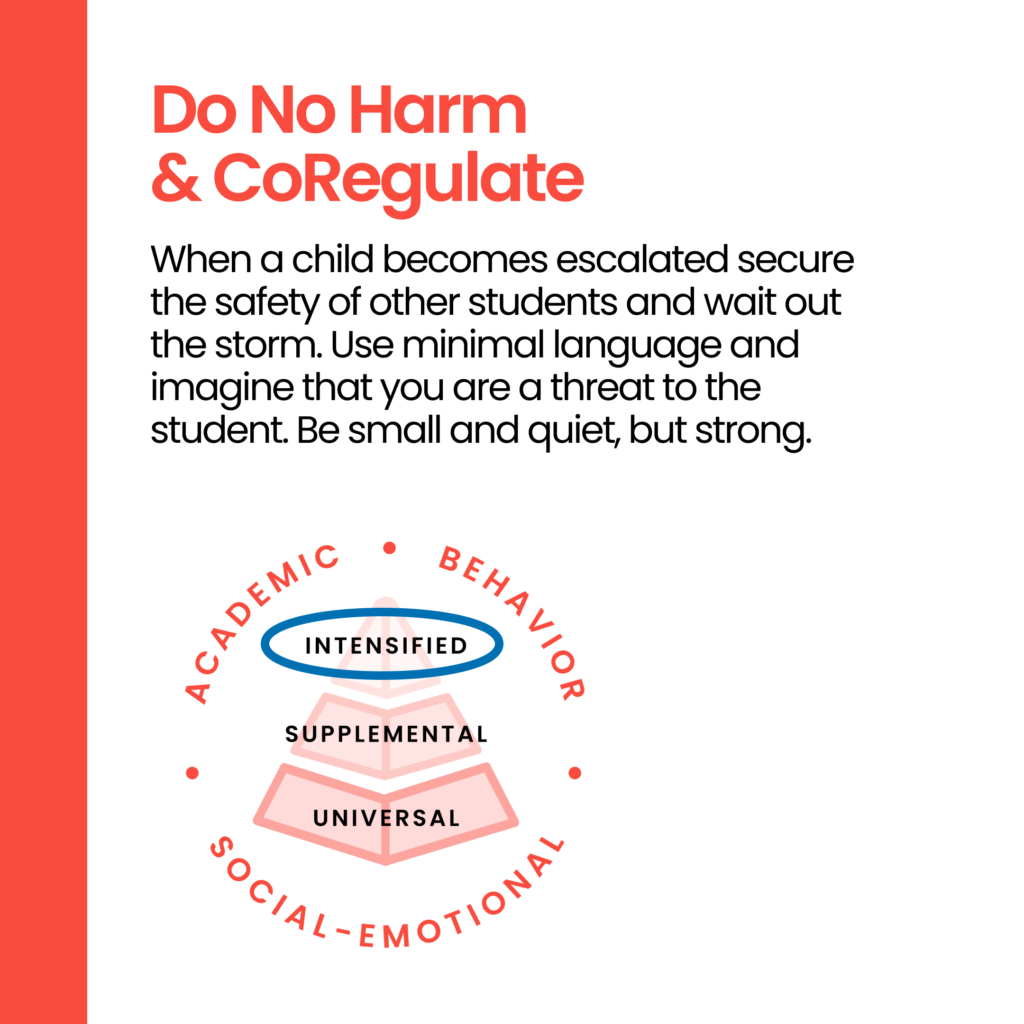
Researchers will tell you the best answer to the question “What can you do at school to support student academic, behavioral, and social emotional success?” is “MTSS” (Nitz, et al., 2023; AIR, 2021). But more importantly (to us!), Elevo Coaches, our practitioners in the afterschool trenches, rely on the same framework to support students in their expanded learning programs. This holistic approach ensures the “whole” development of each child across all learning environments.
References
American Institutes for Research, 2021
Orange County Department of Education, 2023 (MTSS visual)
National Association of School Psychologists, 2023
Nitz, J., Brack, F., Hertel, S., Krull, J., Stephan, H., Hennemann, T., & Hanisch, C. (2023). Multi-tiered systems of support with focus on behavioral modification in elementary schools: A systematic review. Heliyon, 9(6)
MTSS Después de Escuela: Desbloquear el Éxito de los Estudiantes
Cuando hablamos con posibles socios del distrito, a menudo nos hacen las preguntas “¿Cómo apoya Elevo el comportamiento positivo de los estudiantes?” La respuesta es a la vez profundamente simple y existencialmente compleja. Apoyamos el éxito de los estudiantes, ya sea académico, conductual o socio-emocional a través de un marco simple conocido en educación como Sistemas de Apoyo de Múltiples Niveles (MTSS). La estructura del MTSS organiza nuestros apoyos estudiantiles basados en evidencia adoptados; desde las prácticas fundamentales que reciben todos los estudiantes, hasta las prácticas que nos guían cuando un estudiante está en crisis. Al igual que nuestros socios del distrito, aprovechamos el diseño intencional que fomenta el desarrollo integral de cada niño. El Marco MTSS de California que conocemos en todo el estado incorpora 5 dominios basados en evidencia en apoyo de 11 características para crear entornos de aprendizaje inclusivos y equitativos.
Con MTSS, los recursos adoptados se organizan en tres niveles. Nivel Uno incluye Apoyos Universales proporcionados a TODOS los estudiantes independientemente de su perfil de necesidades. Estas prácticas incluyen el Diseño Universal para Aprendizaje (UDL) y el Aprendizaje Socio-Emotional (SEL). Los recursos del Nivel Dos son Apoyos Suplementarios a los que ALGUNOS estudiantes tendrán acceso, según sus necesidades. Un programa de intervención de lectura o grupos de asesoramiento a corto plazo entrarían en este nivel. Los apoyos de Nivel Tres son aquellos que se Intensifican para satisfacer las necesidades de POCOS estudiantes en un día determinado. Ejemplos de estos recursos son la respuesta a crisis y los servicios a largo plazo que pueden estar definidos por el IEP de un estudiante. Como un mercado metafórico, con estantes llenos de prácticas, apoyos y servicios, los adultos examinan las opciones y hacen selecciones para satisfacer las necesidades de cada estudiante y tener el éxito a su alcance.
La mayoría de las veces pensamos en MTSS en el contexto de la jornada escolar, pero considerando la reciente evolución del panorama extraescolar en el estado de California como resultado de la financiación del Programa de Oportunidades de Aprendizaje Ampliadas (ELO-P), encontramos tanto la oportunidad como la obligación de ampliar la uso de este sabio marco en nuestros programas extracurriculares. En Elevo, seleccionamos la parte superior del conjunto de prácticas de alto impacto, las organizamos en nuestro marco MTSS y capacitamos a nuestros entrenadores para que, cuando tengan dudas, deben confiar en los niveles.
Nivel 1 de Elevo – Apoyos Universales (Todos los Estudiantes)
Estos esfuerzos están integrados en el diseño educativo de nuestro programa para brindar acceso a todos. En Elevo, esto incluye nuestras cinco Prácticas Básicas, rutinas que se integran diariamente en todos los programas. Una de esas prácticas es el Círculo Comunitario. Esta actividad restaurativa anima a todos los estudiantes a expresar sus perspectivas, fomentando la comunicación dentro de una comunidad predecible, saludable y segura. Al enfatizar las habilidades fundamentales para las relaciones, promueve la seguridad y contribuye a un clima positivo.
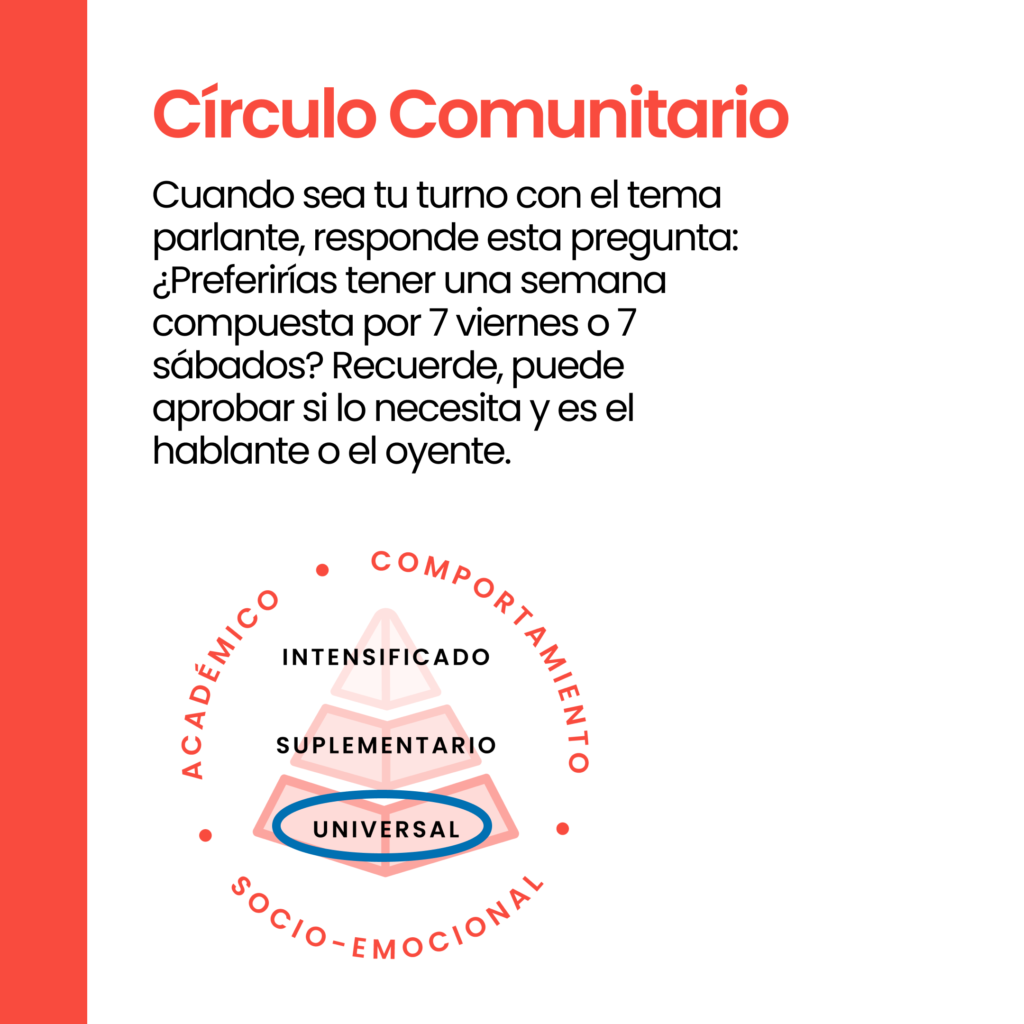
Nivel Dos de Elevo: Intervenciones Suplementarias (Algunos estudiantes)
Los apoyos de Nivel 2 están diseñados para aquellos que pueden necesitar ayuda adicional para acceder al éxito y ser incluidos. Sabiendo que surgirán dificultades, nuestros entrenadores están preparados con herramientas para ayudar a navegar y desarrollar habilidades rezagadas. Un ejemplo de nuestras prácticas de alto impacto de nivel dos es lo que llamamos Giro de Trama, que es exactamente lo que parece. Cuando un entrenador ve que un estudiante inicialmente se está distrayendo o desconectando y podría beneficiarse de una interrupción, el entrenador dirige un cambio en su atención y lo vuelve a involucrar en una actividad. No es ciencia del cerebro, pero también lo es…
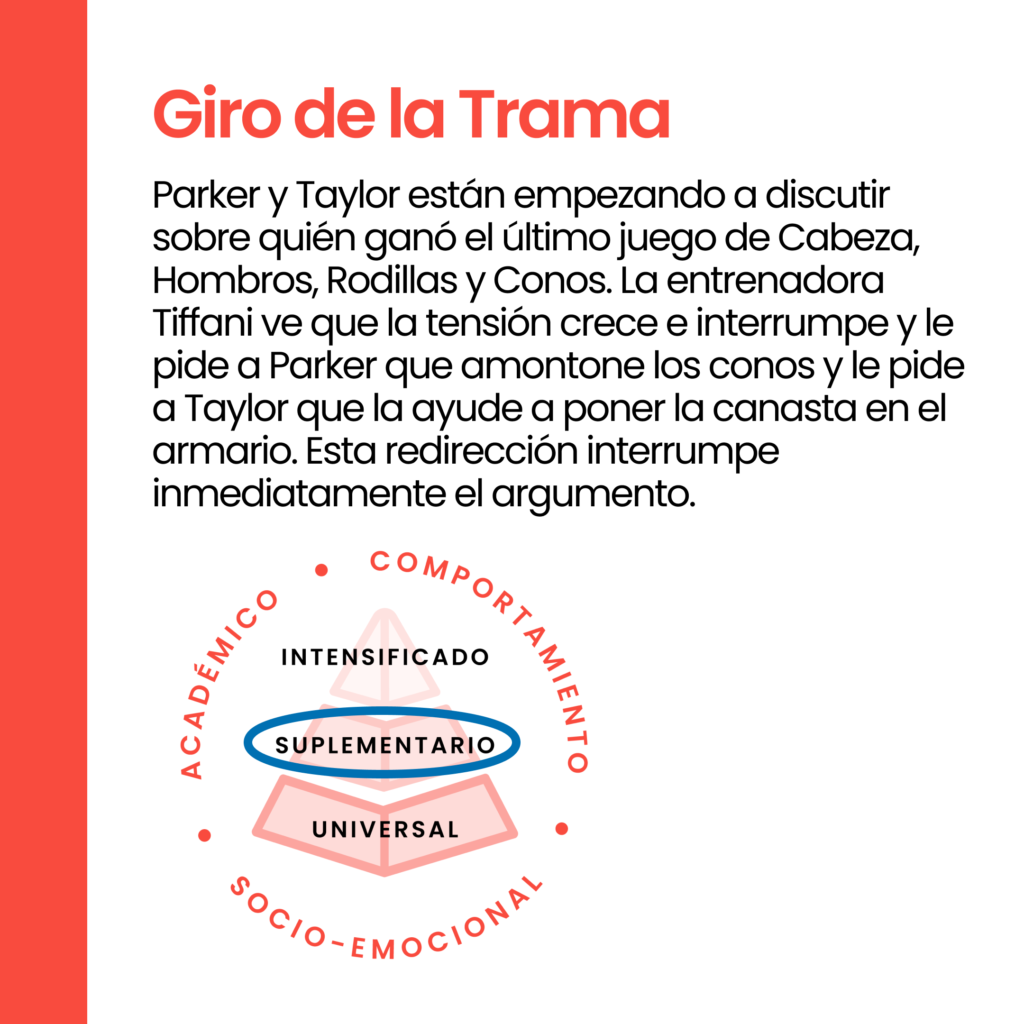
Nivel 3: Intervenciones Intensificadas (Pocos Estudiantes)
Estos apoyos rara vez se utilizan y con la mayor flexibilidad en los programas después de escuela y la oportunidad de redefinir el éxito de los estudiantes, encontramos que las escaladas y la necesidad de intervenciones intensivas son menos frecuentes. Sin embargo, los Entrenadores reciben capacitación sobre la ciencia de la corregulación y cómo responder cuando un estudiante está en crisis; atendiendo primero a la seguridad de los estudiantes y segundo a No Hacer Daño hasta que pase la tormenta.
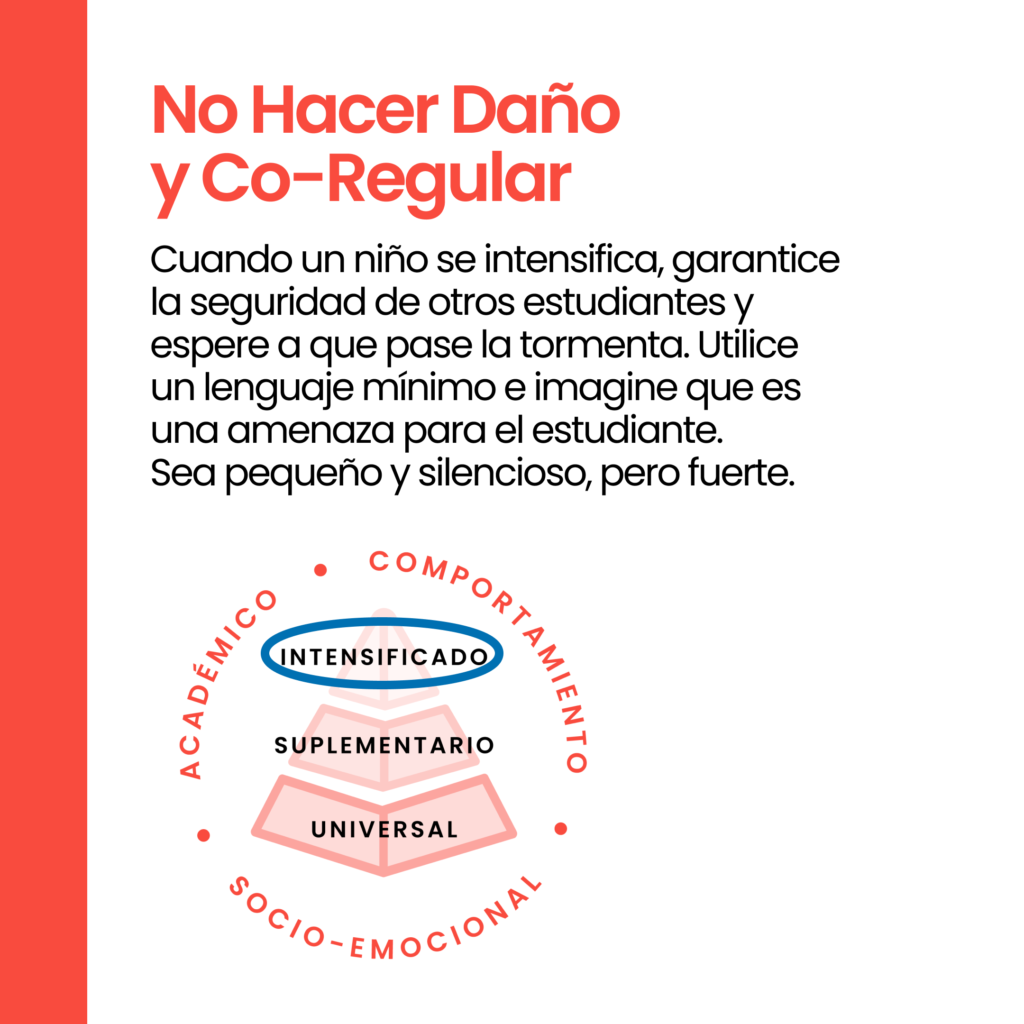
Los investigadores le dirán la mejor respuesta a la pregunta “¿Que se puede hacer en la escuela para apoyar el éxito académico, conductual y socio-emocional de los estudiantes?” es “MTSS” (Nitz, et al., 2023; AIR, 2021). Pero lo más importante (¡para nosotros!), es que los Entrenadores de Elevo, nuestros profesionales en las trincheras después de escuela, confían en el mismo marco para apoyar a los estudiantes en sus programas de aprendizaje ampliados. Este enfoque holístico garantiza el desarrollo “integral” de cada niño en todos los entornos de aprendizaje.
Referencias
American Institutes for Research, 2021
Orange County Department of Education, 2023 (MTSS visual)
National Association of School Psychologists, 2023
Nitz, J., Brack, F., Hertel, S., Krull, J., Stephan, H., Hennemann, T., & Hanisch, C. (2023). Multi-tiered systems of support with focus on behavioral modification in elementary schools: A systematic review. Heliyon, 9(6)




